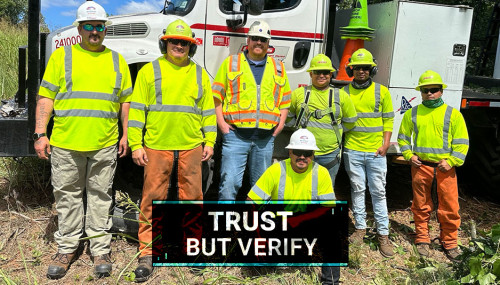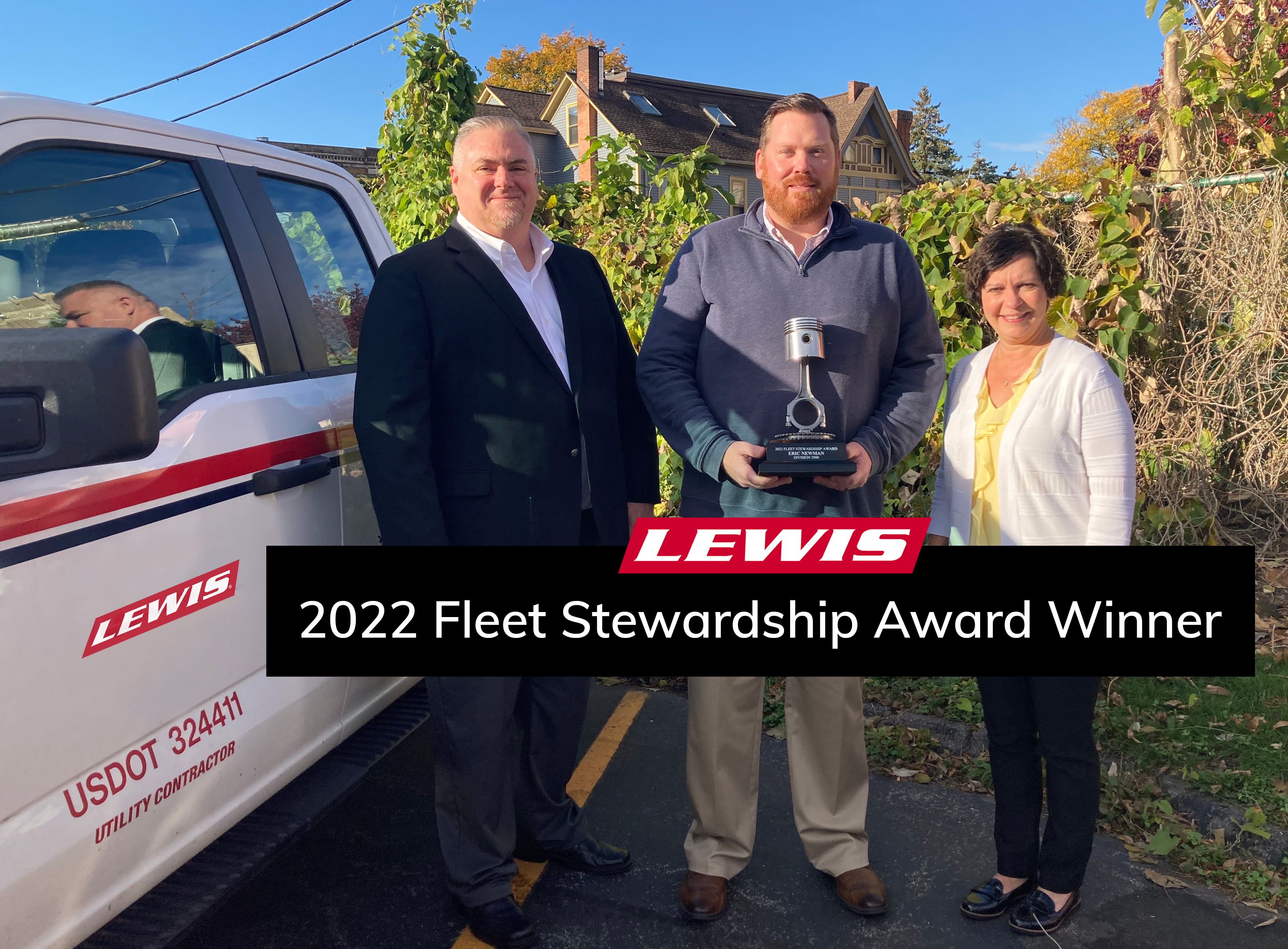“Do you trust me?” the interviewer asked.
The meeting had been winding down and going very well thus far—so well that Eric Newman thought a job offer could be forthcoming. Now he wasn’t so sure.
 Lewis Crew, Division 29
Lewis Crew, Division 29
“Do you trust me?” the interviewer asked.
The meeting had been winding down and going very well thus far—so well that Eric Newman thought a job offer could be forthcoming. Now he wasn’t so sure.
“Do I TRUST you?” Newman repeated with a bewildered look. The Vice President calmly replied, “Yes, do you trust me?” Not sure if this was a trick question—one that could potentially derail his chances for a career at Lewis Services—Newman quickly considered various safe answers and then opted for honesty.
“No, this is the first time I’m meeting you. Trust is built over a period of time.” With nothing to lose, except possibly a job offer, Newman doubled-down on his convictions and continued, “To me, trust is earned—it’s not simply given.”
Newman’s answer must have struck the right chord because he was offered the job and—nearly 10 years later—serves as one of Lewis’ Operational leaders. As a testament to his work ethic and character, he has risen through the ranks during the past decade and advanced from General Foreperson to Senior Supervisor to Area Manager and now Division Manager. And though his roles, responsibilities, and even geographic locations have changed over the years, Newman firmly sticks by his original belief that trust is not loosely handed out. For Newman, trust must be continuously cultivated, earned, and reaffirmed—which is why his favorite Leadership in Action Principle is “Trust but verify.”


Trust is built over a period of time…trust is earned—it’s not simply given.

Though Newman has amassed 22 years of experience in vegetation management, his career path was originally headed in a very different direction. After high school graduation, Newman attended college in Western New York with the goal of becoming a police officer and eventually a state trooper. To earn some money during the summer, Newman’s uncle offered him a job with a large vegetation management company. “I had never paid attention to utility vegetation management before that,” he admits. “I really didn’t know anything about it. But I liked the work and the opportunity to learn and advance, so I stayed—for 12 years.”
That summer job changed the course of Newman’s life. For the next dozen years, Newman worked hard and forged a new path. He started as a grounds person, was promoted to crew foreman, and eventually became a forestry consultant. As he learned the ropes of UVM, he joined a union and started honing his own leadership skills. His father was adamant that, “Your name and your word—you want to keep those in good standing. If you say you’re going to do something, then you’d better do it,” and he took this advice to heart. Those sage words, rooted in trust and accountability, quickly became building blocks for a strong leadership vision—one that has continued to deepen and mature over the years.

Newman concedes that the relationship between “trust” and “verify” can get a little tricky. Some may challenge, “If you trust me, then why are you checking up on me?” Newman understands how this can seem contradictory and points to history for greater context. He explains that “Trust but verify” is actually a Russian proverb that Ronald Reagan invoked during the Cold War while negotiating nuclear disarmament. “At that time, “trust but verify” carried a crucial message. While the two superpowers had to establish a certain level of trust, they also needed to verify that each party was upholding their end of the bargain. This concept served as a vital safety net in a world where one wrong move could lead to catastrophic consequences.”

Trust is hard earned, easily lost, and difficult to reestablish. In our fast-paced industry, trust is a valuable commodity. As the trust-but-verify principle suggests, fostering an environment of trust while maintaining a degree of accountability and support takes time—but it’s possible. And critical.

In UVM, the stakes are also very high for crews, their customers, and the communities they serve. Newman advises that each situation can be different with various underlying factors that might call for a special approach. Consequently, he strives to assess situations individually to find the right balance between trust and verification to maintain healthy relationships and foster a productive working environment. When the stakes are high— a new customer, tight deadlines, significant financial implications—Newman leans heavily into the “verify” side of the equation. He explains, “My involvement doesn’t mean I’m micromanaging the team, but rather I’m offering guidance, support, and feedback throughout the process.”
Conversely, if there is sufficient time, lower thresholds, and the potential consequences of failure are less severe, Newman has a lighter touch. “My involvement can be much less in this process. I set my expectations upfront and verify at the end. Giving my team more autonomy and allowing for learning through failure can be a valuable strategy in certain controlled environments.”
To truly embed this principle into Lewis’ leadership culture, Newman believes that “trust but verify” needs to be a two-way street. Just as he works with his teams to verify that they’re all on the same page and share expectations, he also partners with his regional vice president and the entire Lewis leadership team to verify that they’re collectively delivering on Lewis’ company mission and promise. By committing to this two-way exchange, Newman and his colleagues are creating an entire system built on trust and accountability.


Eric receiving the Fleet Stewardship Award
Years of dedication to Lewis, his teams, and creating a culture predicated on trust have not gone unnoticed. While Newman’s professional path may have taken an unexpected turn at the beginning, it’s no surprise that he was chosen to be part of Lewis’ Emerging Leaders Program in 2018 and then selected as the first recipient of the Fleet Stewardship Award in 2022.
Founded by Chad Fay, Lewis’ Senior Vice President of Operations Support, the Fleet Stewardship Award was created to inspire exceptional stewardship of Lewis fleets and recognize those who have achieved industry excellence. Fay explains, “Being selected as the recipient of Fleet Stewardship Award is not an easy feat. From a quantitative standpoint, we have established rigorous metrics related to compliance scores, inspections, utilization rates, and driver qualifications.” Fay continues, “But it’s not just about numbers. Recipients of this award are leading by example. They’re constantly innovating. And they consistently lead with a “WE, not me” approach.”
Being chosen as the inaugural recipient of the Fleet Stewardship Award was due, in large part, to Newman’s “trust but verify” approach to the maintenance and management of assets in his fleet. Newman is humble but proud when referencing the award and Emerging Leaders program, and continues to hold himself accountable for maintaining the high expectations associated with these honors.
“Trust is hard-earned, easily lost, and difficult to reestablish,” Newman candidly states. “In our fast-paced industry, trust is a valuable commodity. As the trust-but-verify principle suggests, fostering an environment of trust while maintaining a degree of accountability and support takes time—but it’s possible. And critical.”
For Newman, it’s all about striking the right balance between setting expectations, providing autonomy, remaining engaged, and maintaining trust while mitigating risks. His advice? “Trust the process, trust the system, trust your teams—and verify.”

Trust the process, trust the system, trust your teams—and verify.
